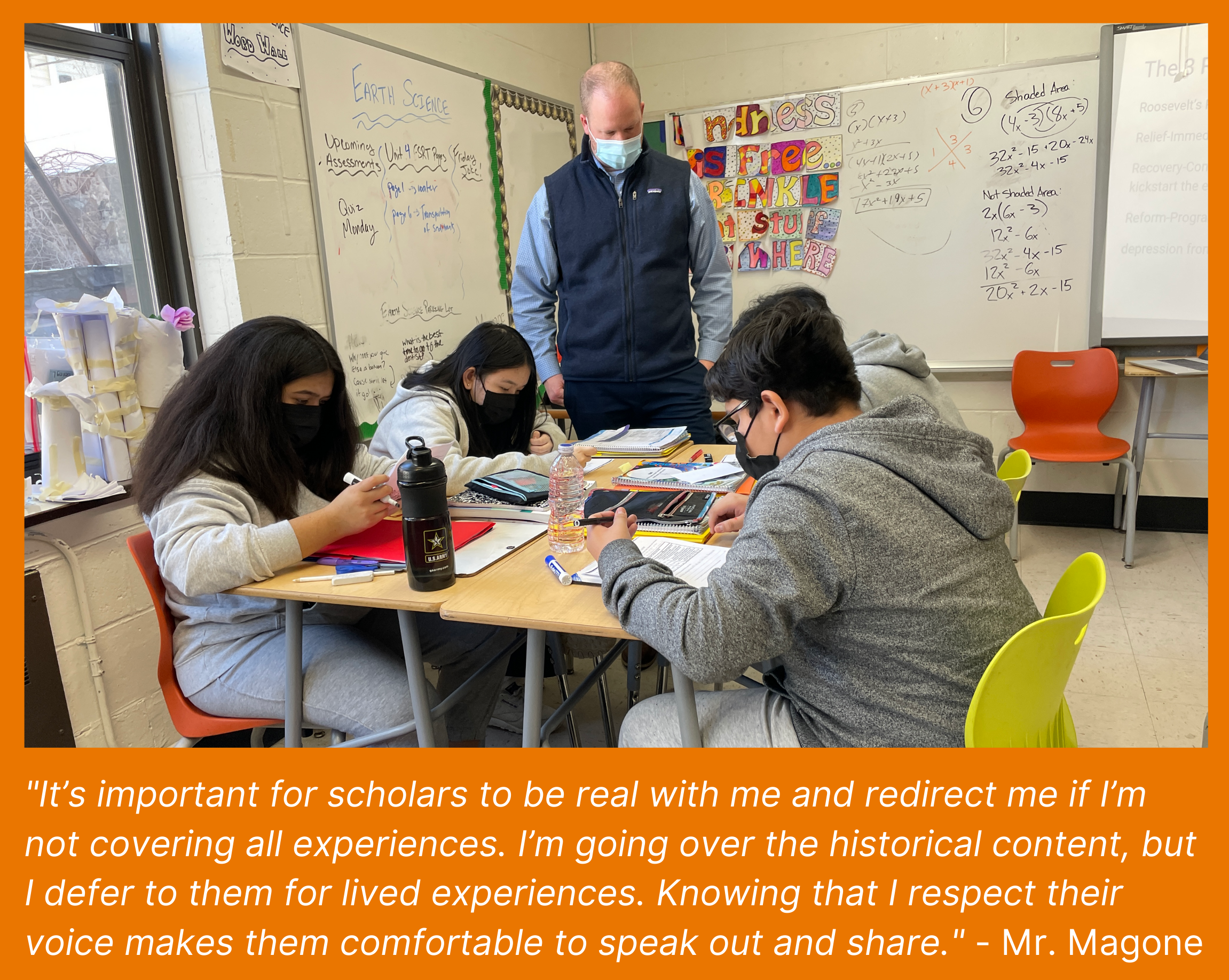CQA HSS Teacher Presents to the Diverse Charter Schools Coalition
CQA HSS teacher, Brian Magone recently presented at the Diverse Charter School Coalition’s annual convening, “Care, Courage and Commitment: Deepening our Vision of Diverse by Design”.
The convening provided space for educators to share their approach to centering collective care in intentionally integrated schools and to recommit to the mission of educational justice.
Mr. Magone reflected on what he shared with his fellow educators about teaching US History in one of the most culturally diverse and immigrant-rich zip codes in the country.
Which historical events do scholars seem to most connect with?
A lot of our scholars or their parents immigrated to the United States and can connect with immigration throughout history. We talk about the immigrant experience, assimilation, American multiculturalism, national allegiances, and historical attitudes towards immigration.
Many scholars or their family have been targets of recent anti-immigrant attitudes or have been impacted in some way by it - like the travel bans and the recent targeting of the AAPI communities during COVID. It’s personal to them.
How do you cultivate and leverage that personal connection to help them learn?
I’m very deliberate about pointing out parallels and asking scholars to think about how a historical moment compares to today. I want history to feel real to them and I want them to make a connection to it. If I taught history the way it was taught when I was in school, we’d all be sleeping! We have more discussions, it's more interactive and less lecture based. I rely on the scholars more. I’ve learned that it’s ok if I give up a little ownership of the discussion for them to run with it and be truly engaged.
We do a lot of reflective writing work comparing and contrasting history to the present day. Many scholars dive right in and will ask their parents questions or write about what they personally remember about their immigration experience. They want their stories told and they want to make sure that their voice and perspective is heard.
How do you nurture the classroom environment necessary for these conversations to happen?
It’s important for scholars to be real with me and redirect me if I’m not covering all experiences. I’m going over the historical content, but I defer to them for lived experiences. Knowing that I respect their voice makes them comfortable to speak out and share.
Recently one scholar wanted to make sure we were going to discuss the history of the LGBTQI community - a community they personally identified with. They wanted to know if we were going to talk about the Lavender Scare and McCarthyism. I’m proud that the scholar felt comfortable advocating for that perspective and experience to be taught in our classroom.
Does the culture of CQA as a school contribute to your ability to adapt the curriculum to these experiences?
During the DCSC conference, a teacher asked me how I am able to convince my principal to give me the leeway to appropriately adapt the curriculum to make space for scholar voices. I said, I don’t have to convince them. Including diverse, lived experiences into our curriculum is already what we do - it’s a part of our school culture. It's encouraged and supported here. I feel lucky to be teaching these scholars, in this state, at this school where we are able to have these critical conversations. This wouldn't be possible in many other places right now.
What is the benefit to you as an educator teaching a culturally diverse student body?
I’ve been teaching this curriculum for 16 years and in my early years of teaching I didn’t often stop and see teachable moments and take the opportunity to dive deeper. These scholars help me do that. Every year, I learn a new perspective and way of thinking about history - it keeps it exciting for me. Nothing in history is in stone, it's evolving. It's exciting to see a diverse group of students who look at history differently. I learn from them every day.

